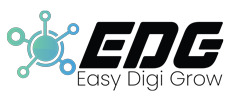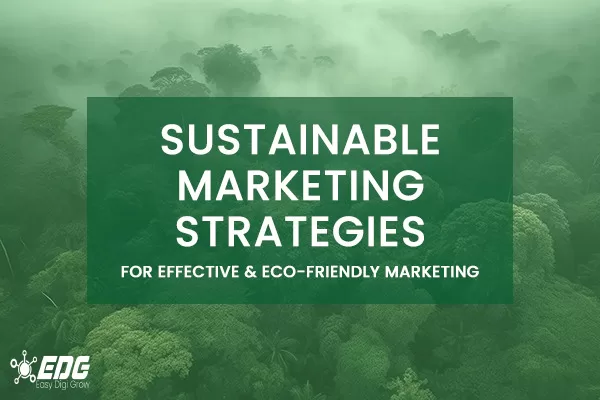The Future is Green: 10 Game-Changing Sustainable Marketing Strategies for the Digital Age
Welcome to a world where conscious consumerism and environmental responsibility are shaping the way businesses thrive. In this blog, we embark on an inspiring journey into the world of sustainable marketing strategies—a transformative approach that not only benefits the planet but also creates a powerful connection with like-minded consumers.
So, whether you’re an entrepreneur, a conscious consumer, or simply curious about the future of commerce, join us on this enlightening journey.
Together, let’s unlock the secrets of sustainable marketing, pave the way for a greener future, and embark on a path of shared prosperity.
The time for change is now—let’s make sustainability the foundation of a thriving digital age.
What is Sustainable Marketing?
Sustainable marketing means promoting products, practices, and brand values that are good for the environment and society. It is a way for businesses to show their commitment to sustainability and to connect with consumers who are increasingly interested in buying from companies that share their values.
Sustainable marketing can take many different forms, from using recycled materials in packaging to donating a portion of profits to environmental causes. It can also involve changing the way businesses operate, such as by reducing their energy consumption or water usage.
The Importance of Sustainable Marketing
Furthermore, sustainable marketing is no longer just an option; it has become a necessity for businesses aiming to thrive in the digital age. Here are a few reasons why sustainable marketing is crucial:
- Meeting Consumer Expectations: In recent years, consumers have become increasingly conscious of environmental issues. They expect businesses to adopt sustainable practices and show commitment to environmental responsibility.
- Enhancing Brand Reputation: By implementing sustainable marketing strategies, businesses can build a positive brand image. Customers are more likely to support and recommend brands that demonstrate a genuine commitment to environmental sustainability.
- Gaining a Competitive Advantage: Sustainable marketing can set businesses apart from their competitors. With more consumers actively seeking eco-friendly products and services, companies that prioritize sustainability can attract a larger customer base and gain a competitive edge in the market.
10 Sustainable Marketing Strategies in the Digital Age
- Product Innovation:
By developing eco-friendly products, businesses can align with sustainability goals. Moreover, this involves using sustainable materials, reducing waste, and promoting energy efficiency in product design and manufacturing processes. Additionally, customers are increasingly attracted to products that offer environmental benefits.
- Green Packaging:
Packaging plays a crucial role in sustainable marketing. Businesses can opt for recyclable, biodegradable, or compostable packaging materials to minimize waste and environmental impact. Additionally, reducing excessive packaging and utilizing innovative packaging designs can further contribute to sustainability efforts.
- Supply Chain Management:
Businesses can collaborate with suppliers who prioritize ethical and environmentally friendly practices. This includes sourcing materials responsibly, reducing carbon emissions in transportation, and promoting fair labor practices. Transparent supply chain management builds trust with environmentally conscious consumers.
- Digital Marketing:
Leveraging digital platforms can significantly reduce the environmental footprint of marketing efforts. Digital marketing strategies, such as targeted online advertising and content marketing, enable businesses to reach a wider audience while minimizing the use of physical resources. Social media platforms and email marketing campaigns can effectively engage with customers and promote sustainable initiatives.
- Consumer Education:
Educating consumers about the importance of sustainability and the environmental benefits of products or services is a powerful strategy. Businesses can share information through blog posts, social media campaigns, and educational videos to raise awareness and encourage sustainable choices. Empowering consumers to make informed decisions supports the overall goal of sustainable marketing.
- Collaborations and Partnerships:
Collaborating with like-minded organizations, NGOs, or sustainability-focused initiatives can amplify the impact of sustainable marketing efforts. Joint campaigns, partnerships, or sponsorships can raise awareness about environmental issues and promote sustainable practices. Aligning with reputable organizations strengthens the credibility and effectiveness of sustainable marketing initiatives.
- Corporate Social Responsibility (CSR):
Integrating sustainability into corporate social responsibility initiatives is essential for sustainable marketing. By supporting environmental causes, engaging in community initiatives, or donating to relevant nonprofits, businesses demonstrate their commitment to the environment and society. Sharing CSR efforts through various marketing channels helps build a positive brand image.
- Green Events and Promotions:
When hosting events or promotions, businesses can prioritize sustainability. Implementing eco-friendly practices such as using recycled materials for event banners, offering digital tickets instead of paper ones, and providing reusable or compostable utensils and containers can minimize waste generation and environmental impact.
- Employee Engagement:
Involving employees in sustainability efforts can foster a culture of environmental responsibility within the organization. Encouraging and incentivizing employees to adopt sustainable practices both at work and in their personal lives can create a positive ripple effect and reinforce the company’s commitment to sustainability.
- Measuring and Reporting Impact:
To ensure ongoing progress and accountability, businesses should measure and report their sustainability efforts. This includes tracking key performance indicators (KPIs) such as carbon emissions, waste reduction, and energy consumption. Transparently communicating these results to stakeholders showcases the commitment to sustainable marketing and encourages continuous improvement.
Examples of Companies in India that are Using Sustainable Marketing
- FabIndia
FabIndia is a clothing company that is known for its use of sustainable materials and practices. The company sources its fabrics from over 100,000 artisans across India and ensures that they are paid fair wages.
FabIndia also uses recycled materials in its packaging and has a number of initiatives to reduce its environmental impact, such as using solar power in its stores.
FabIndia uses its digital marketing channels to promote its sustainable products and practices, such as through its “Good Earth” campaign.
- MamaEarth

MamaEarth is a personal care brand that is committed to using natural and sustainable ingredients in its products. The company sources its ingredients from small farmers and communities across India and ensures that they are grown without the use of harmful chemicals.
MamaEarth also uses recycled materials in its packaging and has a number of initiatives to reduce its environmental impact, such as offsetting its carbon emissions.
MamaEarth uses its digital marketing channels to promote its sustainable products and practices, such as through its “Conscious Planet” campaign.
Conclusion About SustainableMarketing Strategies
Sustainable marketing not only meets consumer expectations and enhances brand reputation but also contributes to a greener future for all. It is crucial for businesses to recognize the significance of sustainable marketing and commit to its long-term implementation.
At EasyDigiGrow, we understand the power of sustainable marketing and are here to help businesses navigate this transformative landscape, unlock their potential, and thrive in a world where sustainability and success go hand in hand.
FREQUENTLY ASKED QUESTIONS ABOUT SUSTAINABLE MARKETING STRATEGIES
- How does the digital age impact the environment?
The digital age contributes to environmental impact through factors like energy consumption in data centers, electronic waste generated by technological advancements, and resource-intensive manufacturing processes.
- How can businesses incorporate sustainability into product development?
Businesses can prioritize eco-friendly features in product design, use sustainable materials, reduce waste in manufacturing, and communicate the environmental benefits of their products to consumers.
- How can digital marketing contribute to sustainable marketing?
Digital marketing minimizes the use of physical resources and enables businesses to reach a wider audience through channels like social media, targeted online advertising, content marketing, and email campaigns.
- How can businesses measure the impact of their sustainable marketing efforts?
Businesses can measure their sustainability efforts by tracking key performance indicators (KPIs) such as carbon emissions, waste reduction, energy consumption, and reporting their progress transparently.
- Can sustainable marketing initiatives contribute to building a positive brand image?
Yes, sustainable marketing initiatives can enhance brand reputation by showcasing a business’s commitment to environmental responsibility, which can attract and retain conscious consumers.
- Can sustainable marketing strategies help businesses gain a competitive advantage?
Yes, sustainable marketing can differentiate businesses from competitors as more consumers actively seek eco-friendly products and services, leading to increased customer loyalty and market share.
 seolounge
seolounge


